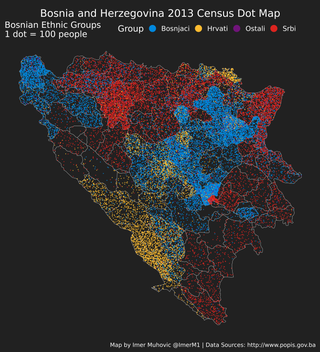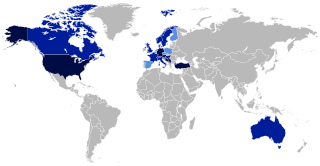
Demographic features of the population of Bosnia and Herzegovina include population density, ethnicity, education level, health of the populace, economic status, religious affiliations and other aspects of the population.

The General Framework Agreement for Peace in Bosnia and Herzegovina, also known as the Dayton Agreement or the Dayton Accords, and colloquially known as the Dayton in ex-Yugoslav parlance, is the peace agreement reached at Wright-Patterson Air Force Base near Dayton, Ohio, United States, finalised on 21 November 1995, and formally signed in Paris, on 14 December 1995. These accords put an end to the three-and-a-half-year-long Bosnian War, which was part of the much larger Yugoslav Wars.
The national anthem of Bosnia and Herzegovina was composed in 1998 by Dušan Šestić and was adopted provisionally in 1999, before being officialized in 2001. It has no official lyrics, though unofficial lyrics have been written for it.

More than 96% of population of Bosnia and Herzegovina belongs to one of its three autochthonous constituent peoples : Bosniaks, Serbs and Croats. The term constituent refers to the fact that these three ethnic groups are explicitly mentioned in the constitution, and that none of them can be considered a minority or immigrant. The most easily recognisable feature that distinguishes the three ethnic groups is their religion, with Bosniaks predominantly Muslim, Serbs predominantly Eastern Orthodox, and Croats Catholic.

The national flag of Bosnia and Herzegovina contains a medium blue field with a yellow right triangle separating said field, and there are seven full five-pointed white stars and two half stars top and bottom along the hypotenuse of the triangle.

Muslims is a designation for the ethnoreligious group of Serbo-Croatian-speaking Muslims of Slavic heritage, inhabiting mostly the territory of the former Socialist Federal Republic of Yugoslavia. The term, adopted in the 1971 Constitution of Yugoslavia, groups together several distinct South Slavic communities of Islamic ethnocultural tradition. Before 1993, a vast majority of present-day Bosniaks self-identified as ethnic Muslims, along with some smaller groups of different ethnicities, such as Gorani and Torbeši. This designation did not include Yugoslav non-Slavic Muslims, such as Albanians, Turks and some Romani people.

Jajce is a town and municipality in the Central Bosnia Canton of the Federation of Bosnia and Herzegovina, an entity of Bosnia and Herzegovina. According to the 2013 census, the town has a population of 7,172 inhabitants, with 27,258 inhabitants in the municipality, It is situated in the region of Bosanska Krajina, on the crossroads between Banja Luka, Mrkonjić Grad and Donji Vakuf, on the confluence of the rivers Pliva and Vrbas.
Four major international peace plans were proposed before and during the Bosnian War by European Community (EC) and United Nations (UN) diplomats before the conflict was settled by the Dayton Agreement in 1995.

The Republic of Bosnia and Herzegovina was a state in Southeastern Europe, existing from 1992 to 1995. It is the direct legal predecessor to the modern-day state of Bosnia and Herzegovina.
Bosniaks are a South Slavic ethnic group, native to the region of Bosnia of which the majority are Muslims (90%). The term Bosniaks was used to describe everyone in that region regardless of their religion until late 1800s. It was established again after decades of suppression in the Socialist Federal Republic of Yugoslavia. The Bosniak Assembly adopted the ethnonym to replace "Bosnian Muslims." Scholars believe that the move was partly motivated by a desire to distinguish the Bosniaks from the term Muslim to describe their nationality in the former Yugoslavia. These scholars contend that the Bosniaks are distinguishable from comparable groups due to a collective identity based on a shared environment, cultural practices and experiences.
Bosnians, citizens of Bosnia and Herzegovina or people who identify as Bosnians on an interethnic basis.

The Croats of Bosnia and Herzegovina, often referred to as Bosnian Croats or Herzegovinian Croats, are native to Bosnia and Herzegovina and constitute the third most populous ethnic group, after Bosniaks and Serbs. They are also one of the constitutive nations of Bosnia and Herzegovina. Croats of Bosnia and Herzegovina have made significant contributions to the culture of Bosnia and Herzegovina. Most Croats declare themselves Catholics and speakers of the Croatian language.
Bosniak or Bošnjak may refer to:

The Bosniaks are a South Slavic ethnic group native to the Southeast European historical region of Bosnia, which is today part of Bosnia and Herzegovina, who share a common Bosnian ancestry, culture, history and language. They primarily live in Bosnia, Serbia, Montenegro, Croatia, Kosovo as well as in Austria, Germany, Turkey and Sweden. They also constitute a significant diaspora with several communities across Europe, the Americas and Oceania.
The Bosniaks are a South Slavic ethnic group from Bosnia and Herzegovina.
Montenegrins refers to South Slavic people associated with Montenegro.

Bosnians are people native to the country of Bosnia and Herzegovina, especially the region of Bosnia. As a common demonym, the term Bosnians refers to all inhabitants/citizens of the country, regardless of any ethnic, cultural or religious affiliation. It can also be used as a designation for anyone who is descended from the region of Bosnia. Also, a Bosnian can be anyone who holds citizenship of the state of Bosnia and Herzegovina and thus is largely synonymous with the all-encompassing national demonym Bosnians and Herzegovinians.

Ethnic cleansing occurred during the Bosnian War (1992–95) as large numbers of Bosnian Muslims (Bosniaks) and Bosnian Croats were forced to flee their homes or were expelled by the Army of Republika Srpska and Serb paramilitaries. Bosniaks and Bosnian Serbs had also been forced to flee or were expelled by Bosnian Croat forces, though on a restricted scale and in lesser numbers. The UN Security Council Final Report (1994) states while Bosniaks also engaged in "grave breaches of the Geneva Conventions and other violations of international humanitarian law", they "have not engaged in "systematic ethnic cleansing"". According to the report, "there is no factual basis for arguing that there is a 'moral equivalence' between the warring factions".

The Croat federal unit, Croat entity, or third entity, is a proposed federative unit in Bosnia and Herzegovina encompassing areas populated by Croats, to be created by the partition of the Federation of Bosnia and Herzegovina into Croat and Bosniak entities. The proposal is supported by the Croatian National Assembly, which includes the electoral representatives of Bosnian Croats. However, a detailed plan for its partition, including its borders, has yet to be finalized.
In terms of religion, Muslims in Bosnia and Herzegovina are all adherents of Islam in Bosnia and Herzegovina.










